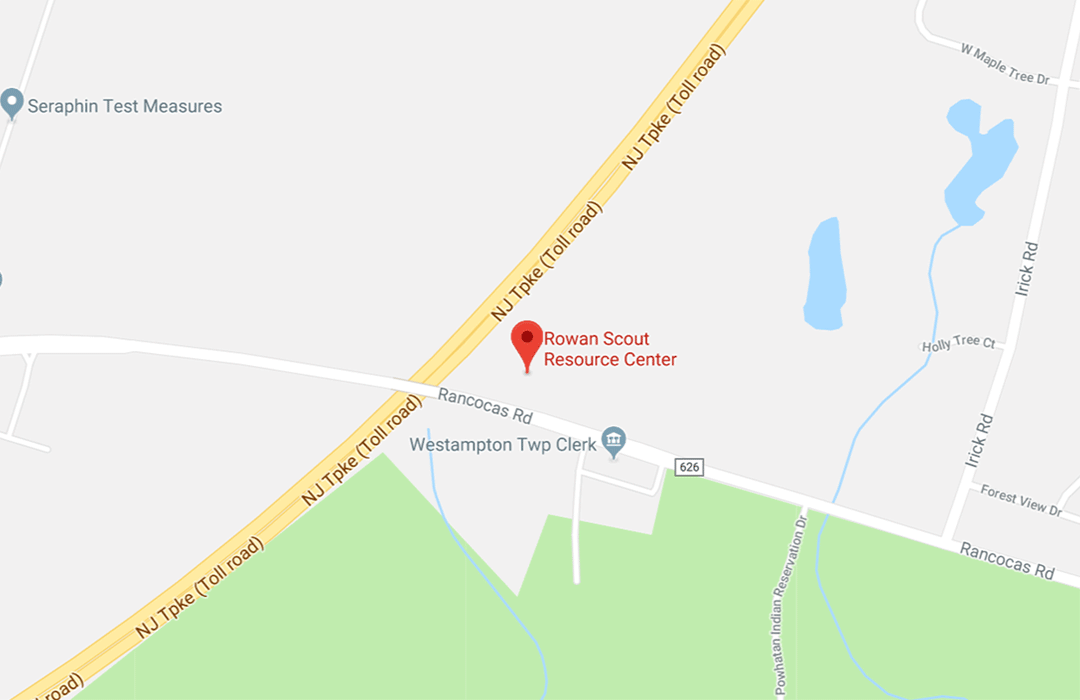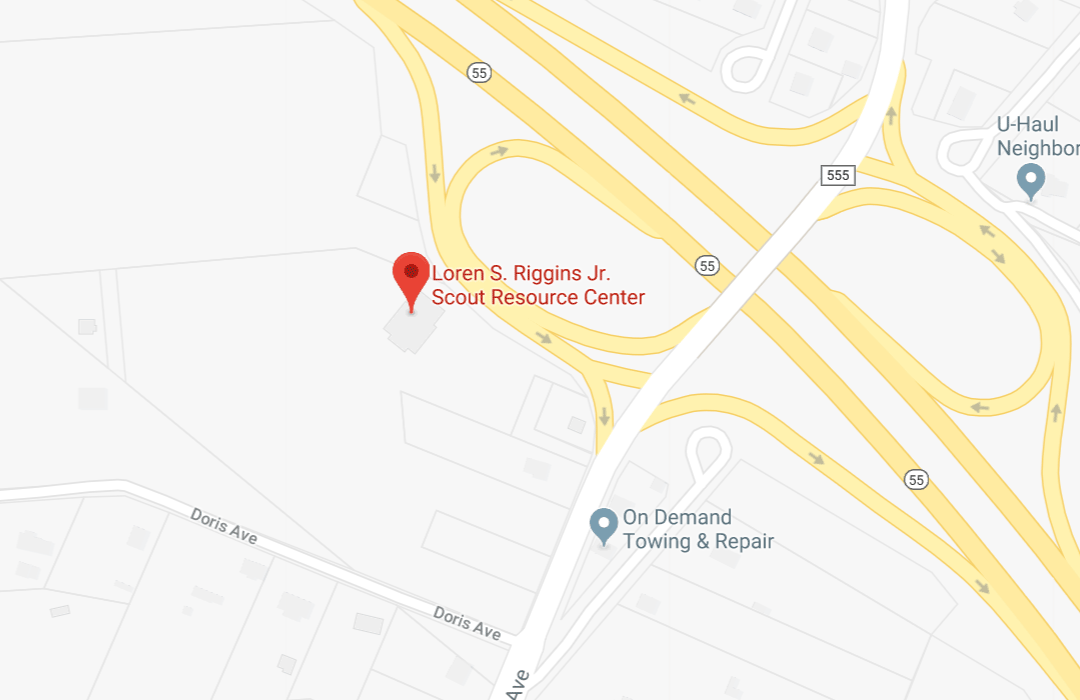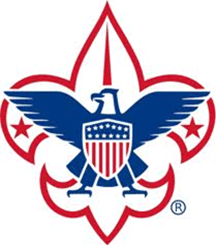
Information Guide
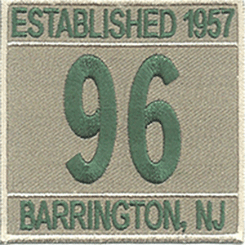
About Troop 96
Boy Scout Troop #96 is chartered in the White Horse District of the Garden State Council, Boy Scouts of America by the Kiwanis Club of the Haddons. We have been in existence since 1957, originally chartered by St. Francis De Sales Church, and have been continually chartered since 1971. We believe that the main purpose of Scouting is to provide boys, our country’s future leaders, with hands on experience in leadership training while also learning valuable lessons in morals and ethics, tools that the boys will use for their lifetimes. We also believe in the true sense of Scouting, that boys learn from other boys, however they are guided by adult leaders of the highest caliber. The true key to our goals is to have fun while learning. All of our adult leaders are trained by the Boy Scouts of America. Troop 96 serves boys from the area communities such as Barrington, Audubon, Haddon Heights, Haddonfield, Lawnside, Magnolia and Somerdale.
Dues and Fees
Troop 96 charges a yearly dues fee of $90.00, payable in two $45.00 installments. The first installment is due in September, and the second installment is due in February. The dues fee covers registration, a subscription to Boys Life Magazine, insurance, and all awards that your son receives that year. The remainder goes into the general troop expenditure fund, and helps to purchase equipment.
New Scouts receive their own copy of The Scout Handbook, Neckerchief, Neckerchief Slide, Troop 96 numerals, Council Strip Patch, and epaulets.
There is also an event fee for most activities. This is a break-even fee that is charged just to cover the costs of that particular event. These fees are kept as low as possible. For example, most campouts carry a troop fee of $15.00, to each scout that attends the campout. This fee covers the campsite registration fee as well as supplies that are purchased for every campout such as propane for the camp lanterns and stoves. The campout fee sometimes is greater than the $15.00. This usually occurs when the event is something other than a regular troop campout, such as a Camporee. During the 2018 – 2019 scouting year the general campout fee is $25.00.
In addition to the troop fee, there is also a fee for the patrols food. This varies between $5.00 and $8.00 per boy per campout depending on the menu that the boys plan, what they can get donated from Mom’s pantry and how shrewd a shopper they are.
A pretty good estimate of costs for the year including dues, campout fees, food fees, event fees, complete ski trip, and summer camp would be about $600. Please bear in mind that this provides approximately 1000 hours of quality scouting experiences for your son, which equates to $.60 an hour, a real bargain especially if you consider what they get from the program such as the one provided by Troop 96. Scouts and parents are encouraged to participate in our fund-raising efforts, however it is strictly voluntary.
Troop Structure
Patrol Leaders Council (PLC)
The largest difference between Cub and Boy Scouts, is in Boy Scouting, the boys do the majority of the planning and decision making within the guidelines set by the adult leaders. The boy that is responsible for making sure things go as planned, and the chief organizer is the Senior Patrol Leader. Underneath him are his assistants. Under the Assistant Senior Patrol Leaders are the troops Warrant Officers, such as the Scribe, Quartermaster, Guide, Instructors, Chaplains Aide, and Historian. The Patrol Leaders then round out this group, which collectively are known as the Patrol Leaders Council (PLC). Boys that are not junior leaders are encouraged to attend this meeting to learn more about the boy planning involvement. This group meets monthly to finalize the plans for the next four to six weeks’ activities and to review the past month’s activities. The Scoutmaster Corps is present at these meetings to guide the boys in their planning efforts. Please see page 24 of the Boy Scout Handbook.
Because we are in a rebuilding mode, several of the positions listed below are currently vacant and will be filled as youth membership grows.
Scoutmaster Corps
The Scoutmaster Corps is made up of the Scoutmaster and his assistants. Together they are responsible for helping the boys achieve their goal of PLC planned activities. The Scoutmasters Corps is best described as advisors, and are there to keep the boys on track, they are not there to “run the show.” This group is also responsible for molding the junior leaders, teaching morals, ethics, and leadership. The Scoutmaster and his assistants have all been trained in the latest BSA policies, including Youth Protection Training. The Scoutmaster Corps reports to the Troop Committee. Please see page 44 of the handbook.
Troop Committee
The Troop Committee is a group of interested parents who usually have boys in the troop. The role of the committee is to support the outings and activities the boys choose to participate in. The committee is organized by the Troop Committee Chairperson who usually has an assistant and several “chairs” beneath him. Some of those chairs are; outdoor, transportation, communications and fund raising. The committee meets monthly to review the operations of the troop, past, present, and future. The committee is always in need of parents that want to become involved in scouting. Parents that want to become more involved on a committee level should contact the committee chairperson. The Troop Charter Organization Representative also attends this meeting to be sure that the program is running as it should.
The Patrol
Most Boy Scout activities are fashioned to occur utilizing the patrol method. The Patrol is made up of six to eight boys, usually of similar age groupings. Together they discover new things in scouting, such as first aid, cooking and camping to name a few. They also compete in scoutcraft games utilizing this method. The boys elect a patrol leader amongst themselves. Elected patrol leaders serve for a term of six months, at which time another election is held. The same boy may be re-elected. The patrol leader is guided in his job by the SPL, ASPL, and Troop Guide. Please see pages 25 and 26 of the handbook.
The New Scout Patrol
First year scout patrols function in the same way as the above described patrols with one difference. The patrol leader is designated by the Scoutmaster corps, usually choosing a boy who was a den chief with the boys when they were in the second year Webelos program. We try as much as possible to keep the same Webelos dens intact during the transition straight through the program. This provides for a natural progression since they are already familiar with each other. The job of the appointed patrol leader is to provide the new scouts with as much knowledge as possible about their new surroundings and to familiarize them with the structure of the troop.
Boy Scout Troop Organization Chart
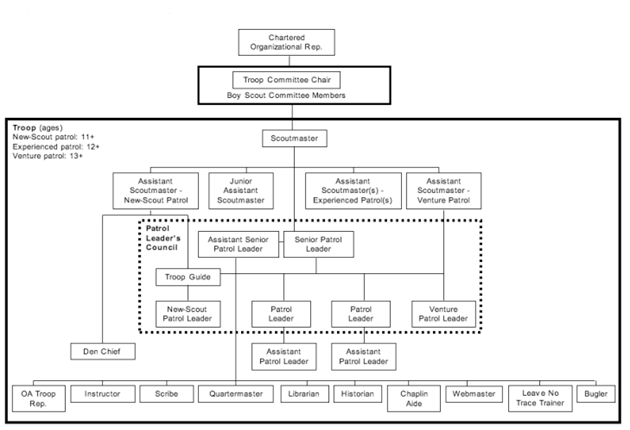
The Boy Scout Handbook
The Boy Scout Handbook is provided by Troop 96 when a boy joins the troop. The handbook is chocked full of knowledge and techniques that a scout should learn to be the best that he can be. The current edition is organized in sections based on scout skills. For instance, for First Aid, the requirements for all Boy Scout Advancement Ranks are listed in one section beginning on page 104. The purpose for this is that a Scout can work on advancement for Tenderfoot, Second Class and First Class at the same time if he so chooses. The handbook is also a great source for various types of equipment the scout may need during his career in Scouting.
Youth Protection
In this day and age of uncertainty, we must all take as many precautions as necessary to protect not only our children, but also ourselves. Accusations can be made by and about anyone, and the burden of proof to protect the innocent is sometimes extremely difficult. The best preventive action to these is to not get into a questionable situation to begin with. Boy Scout policy is two deep leadership (minimum) at all events, meaning one adult leader cannot be with just one boy at any time unless that boy is your son. Two adult leaders or two boys are needed at any one time, not counting your own son. BSA National regulations requires that all of our adult leaders must complete “Youth Protection Training” and be recertified every two years.
For more ways to protect your children, please read the section inside the front cover of The Boy Scout Handbook, entitled, “How to Protect Your Children from Child Abuse and Drug Abuse: A Parent’s Guide.”
Cub Scout to Boy Scout Transition
It is amazing the difference between two divisions of the same organization. The values and morals training that begins in the Cub program continues in the Boy Scout program, however the boys are now beginning to put that training to use in their everyday decision making. The basic difference in the two programs is in Cub Scouts, the parents are “doing with the kids,” while in Boy Scouting, the boys are learning to become more responsible, more self-sufficient and to do for one another as well as for themselves. The transition is not always easy, and can sometimes be frustrating to watch, but the boys must learn how to do it themselves. Sometimes temporary setbacks are an important part of the learning process.
Fund-Raising
In order to defray the costs of scouting, Troop 96 actively pursues fund raising. Due to our ever-changing world, we do not encourage the boys to solicit door to door on their own unless they are your neighbors, and you feel comfortable with that. Fund raising can be done with neighbors, relatives, friends, and the parents place of business to name a few. For the boys to get the full impact of scouting and becoming more self-sufficient we do suggest that they do as much of the fund raising themselves as possible.
Troop 96 has a unique way of dealing with the profits from our fund-raising efforts. Most organizations that do fund-raising make the majority of the profits, and little, if anything goes back to the persons doing the selling. Our troop gives 75% of all profits of all fund raisers back to the boys, crediting the amount to their troop account. The remaining 25% goes into the general troop treasury to pay for up-dating equipment. For example, if the average total profits from the wreath sale are $5.75 each, the troop would get $1.44 and your son would earn $4.31 for each wreath he sold!
Some of the fund-raising activities are; Christmas wreaths, cookie dough, council popcorn, pizzas, cheese cakes, flowers, and car washes. Your sons account fund may be used for paying dues, ski-weekend fee, summer camp fee, or a super trip. It is quite possible for your son to defray a good portion of the dues and fees because of his fund-raising efforts. Due to the book keeping involved, your sons account fund cannot be used for monthly camping fees.
Advancement
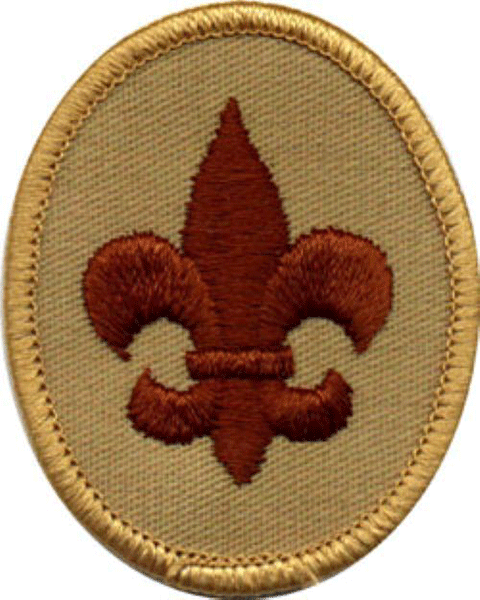
Scout
When a boy joins Troop 96, he joins as a “Candidate”. His first advancement is to the rank of “Scout”. There are a few requirements to this “joining” rank, and these requirements can be found on page 439 of The Boy Scout Handbook. As with all rank advancement, a boy must take part in a Scoutmaster Conference where the Scoutmaster attempts to develop a Scouting relationship with the boy. The next rank is Tenderfoot.
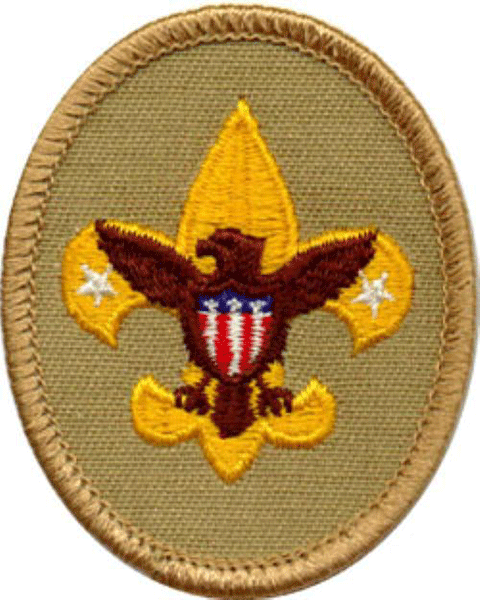
Tenderfoot
To become Tenderfoot, a scout must know the Scout Oath and Law and what they mean, as well as flag etiquette, basic first aid, knowledge of his patrol, and begin camping with the troop. These requirements can be certified and signed off by the patrol leader. Prior to a Scoutmaster Conference, the boy must be reviewed by the Patrol Leaders Council in a Board of Review. Please see pages 440 & 441 of the handbook for all the requirements. The next rank is Second Class.
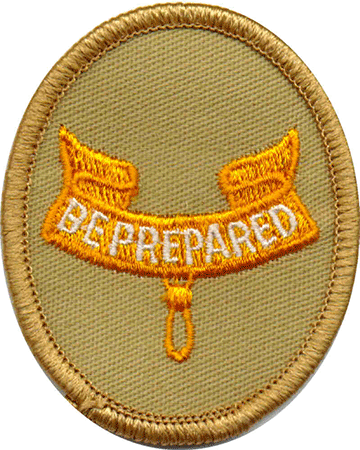
Second Class
The Second Class requirements are more geared to basic camping skills, such as cooking, woods tools use, identifying wild animals and more first aid. The more a boy attends campouts, the faster he will advance, and the better prepared he will be for future challenges both in and out of scouting. The patrol leader can also certify the accomplishing of these tasks for advancement. Please see pages 442 to 444 of the handbook for all the requirements. The next rank is First Class.
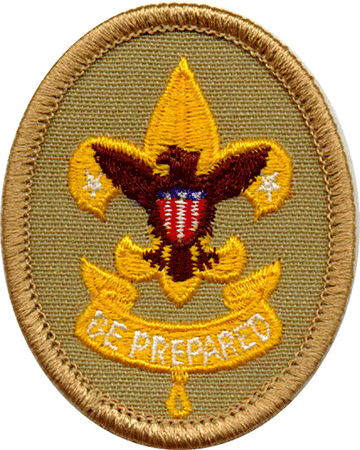
First Class
First Class requirements are deeper in the camping experience. Map and compass skills play important roles, lashings are used to make camp life easier, and advanced first aid play key roles in this rank. The patrol leader can also certify these requirements. When a boy reaches the rank of First Class, he is eligible to become a Junior Leader. Please see pages 445 – 447 of the handbook. The next rank is Star.
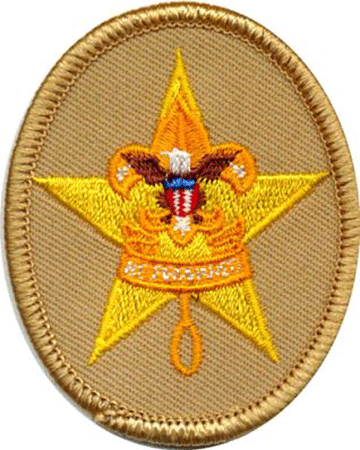
Star
The rank of Star is achieved by the accomplishment of six Merit Badges and four months’ length of service to the unit since obtaining First Class. While in this rank, the boys are really coming into their own in the world and finding out just who they are and what they are capable of.
Junior Leader positions are held by the majority of these boys. By this time the boys have their sights fixed on the rank of Eagle and ideas for an Eagle project should be on their minds. Please see page 448 of the handbook. The next ran is Life.
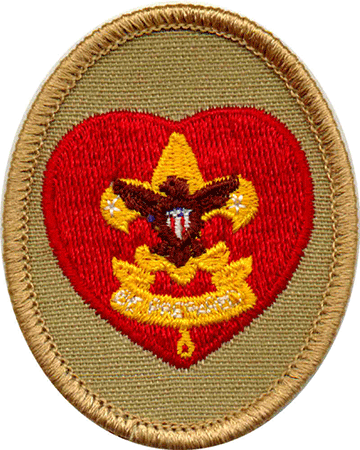
Life
The rank of Life is similar to the rank of Star, accomplished by obtaining five additional merit badges and at least six months of active leadership to the unit as a Start Scout.
Their responsibilities to the unit increase and the scout continues to “give back” to Scouting by teaching younger scouts what they have learned. Please see page 449 of the handbook. The next rank is the pinnacle of advancement, the rank of Eagle Scout.
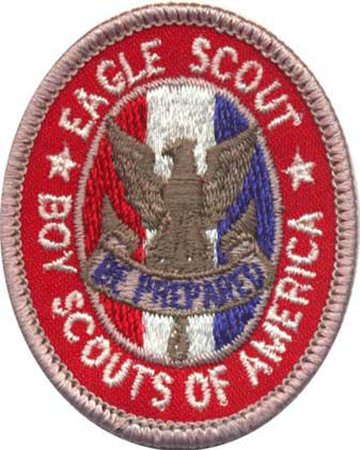
Eagle
The rank of Eagle Scout is the most important thing a boy can achieve while in Scouting. The rank of Eagle says volumes about a boy’s courage, his tenacity, and his ability to stay with a long-term goal through completion. The rank of Eagle Scout often opens doors that may not be available to the average person, such as colleges, military academies, and later on in life, jobs. These institutions view an Eagle Scout as someone a cut above the others. In addition to completing optional and required merit badges, the Life scout must also complete an Eagle Project, which is a service project for his church, school or community, that utilizes his leadership skills. The review and approval processes for Eagle are all particular to this rank. All advancement and the Eagle project must be completed prior to the boys eighteenth birthday. To date, Troop 96 has produced 73 Eagle Scouts in 46 years, far above the national average. Please see pages 450 & 451 in the handbook.
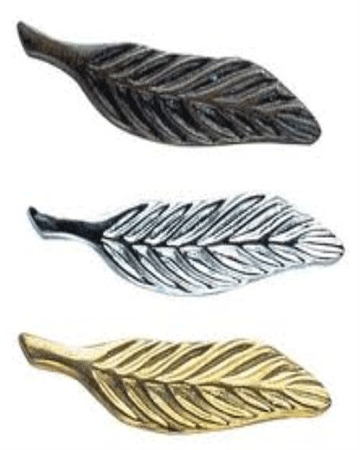
Eagle Palms
After a Scout reaches the rank of Eagle, the fun is not over. He can continue to advance in scouting until his 18th birthday. Advancement after Eagle is in the form of Eagle Palms. One palm is earned for every five merit badges earned over the required amount for Eagle. First the bronze palm is earned, then the gold and finally the silver. Please see page 452 0f the handbook.
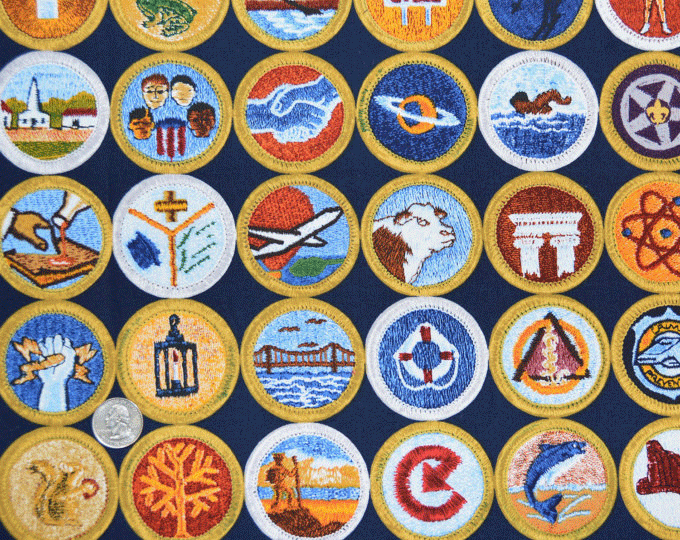
Merit Badges
Merit badges are actually mini-studies in various career fields. It is hoped that these badges will wet the boy’s appetite for a certain area that he may decide to further his education in some day. There are over 120 badges from which to choose. Advancement for the rank of Star, Life and Eagle is centered on merit badges, however a boy can begin earning them as soon as he becomes a Scout. Certain merit badges are required in order to earn the rank of Eagle. Troop 96 has various adults that are merit badge counselors for selected badges. Any adult can become a counselor for a merit badge that they are familiar with. Merit Badges are sewn onto a Merit Badge Sash which is an official part of the uniform, usually worn only for Scoutmaster Conferences, Boards of Review and Courts of Honor. Please see pages 454 through 456 of the handbook.
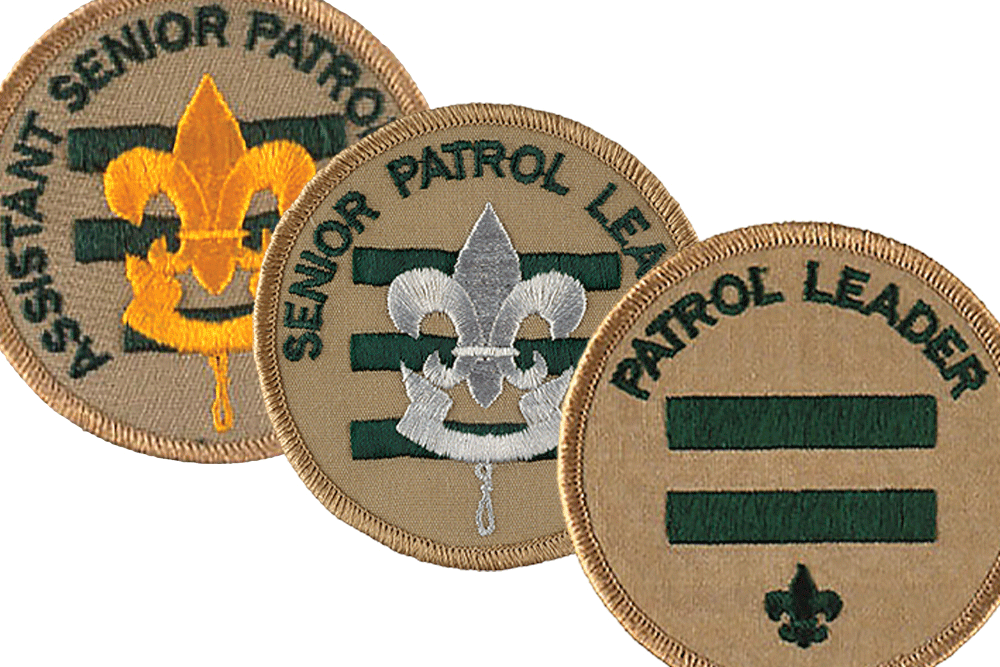
Position of Responsibility
As previously mentioned, BSA requires a Scout to hold a position of responsibility as a requirement for advancement for the ranks of Star, Life and Eagle. It is the policy of Troop 96 to offer these positions through Scout elections or appointment by the Scoutmaster, dependent on the Scouts interests, strengths, weaknesses, and leadership ability. It is important to note that the Scoutmaster Corps strives to instill a strong sense of commitment on the part of our Junior Leaders. Outside activities can sometimes interfere with a Scouts level of activity. It is in our opinion however, that if a Scout is dedicated to the task, he will use his abilities to accomplish his position of responsibility. Please see pages 420 – 423 in the handbook for more specific information.
Community Service
The Boy Scouts of America requires that a certain amount of community service is provided for each rank advancement. Troop 96 believes strongly in the scouts’ bond to the community, and we require that each boy perform a minimum of ten hours of community service for each rank advancement above the rank of Tenderfoot. The rank of Tenderfoot only requires five hours of service. This is a very easy thing to accomplish for an active scout. On average, each our scouts perform thirty hours of service per year. Please see pages 68 & 69 of the handbook.
Courts of Honor
Several times a year, the awards that the boys earn are awarded at a special ceremony known as a Court of Honor. Awards such as rank advancement, merit badges, junior leader offices and special recognitions are given out at this time. This is the time for your son to shine in front of his peers and parents. Parents should make every attempt to attend Courts of Honor. Scouts should wear their full Class “A” uniform and polished shoes.
Troop Meetings
Troop meetings are held weekly, on Sunday evenings from 7:00 PM to 8:30 PM. Patrols are selected by the Senior Patrol Leader on a rotational basis to run certain parts of the meeting. The basic format for a typical troop meeting is; pre-opening, opening, patrol corners, instruction period, game, announcements, Scoutmasters Minute, closing, and a brief PLC meeting after the meeting. The pre-opening is held from 6:45 until 7:00, and is a demonstration or similar activity to keep the boys busy when they come to the meeting early. The pre-opening is put on by the program patrol.
While the program patrol is busy with the pre-opening, the service patrol sets up any needed tables, or gets equipment from the Quartermasters Store upstairs. The service patrol is also responsible for returning things to their original location after the meeting. As the boys come into the meeting it is important that they take care of business. The troop treasurer and the troop scribe are there to assist in receiving money for events and handing out receipts. The opening ceremony is a responsibility of the program patrol. They are asked to make the openings more original than marching the flags in and reciting the Scout Oath and Law.
The major part of the meeting is an instruction period, usually based on scoutcraft. It is typical for the instruction period to be tied to an upcoming event such as a demonstration on winter camping prior to a December campout. The instruction period is usually put on by our troop instructors or other knowledgeable youth from the troop. Occasionally the adult leaders lead an instruction period, and we also have guest speakers from time to time.
Patrol corners is a period where the troop meets by patrols to discuss and make plans for upcoming campouts or other events. This period is led by the patrol leaders. The game period is sometimes focused around the instruction period, which is a kind of a sneaky way to follow up what they just have learned. Other times it is just a good-ole fun time!
After the game period, important announcements are given, and sometimes there are handouts. These announcements deal with important last minute instructions about an up-coming event. Be sure to discuss these announcements with your son. After the announcements is the closing ceremony which is also put on by the program patrol. The PLC meets briefly to discuss how the meeting went.
Troop meetings on Sunday evenings allows the boys plenty of time over the weekend to get the “dreaded” homework done. It is in our opinion that the boys are busy enough with other activity schedules such as CCD, sports, homework, and studying for tests, that scout meetings should not be during the week. Generally speaking, there are no troop meetings on the same weekend as a campout. The exception to this being if there is no meeting the following weekend due to a holiday. Missing two troop meetings in a row leads to communication problems.
Patrol Meetings
A patrol needs to operate as a team. More and more of our children are going to be exposed to team atmospheres in school and not necessarily in sports. Our work areas are also focusing on teams. The sooner the boys learn to work together toward a common goal, the more successful they will be throughout their lives. It is suggested that patrols hold meetings at least twice a month to discuss and plan upcoming campouts and menus as well as plan for their part of the troop meetings. These meetings are in addition to the regular troop meetings and patrol corners. It has however, proven difficult to hold these meetings due to extremely busy personal schedules. The use of the telephone, e-mail, texting or other social media can greatly aid in patrol communications.
Campouts
The word Scouting is mostly made of the word outing, and campouts are the most important outing of the regular scouting experience. It is on these trips that the boys get to put together and use all of the knowledge that is being passed onto them. It is in this setting that the boys are heavily involved in the patrol method and following the chain of command. It is also a time when they get to put to use their culinary talents! This is a great time to be had!
Scouting requires two-deep leadership at all events, Troop 96 will not go camping as a troop with less than two, preferably four trained adult leaders. We take very seriously the responsibility of caring for your son while away from home. Please be assured that scouts and adults sleep in separate tents, and in different areas of the campsite. Individual privacy is a strict issue with the troop. The drop-off location is usually Barrington Borough Hall. A permission slip is required for all events that occur outside of our normal Troop Meeting location.
Getting to and from campouts is a responsibility that is shared by all the boy’s parents. We need to obtain some information from you so that you are permitted to drive boys other than your own son to the troop activities. When you receive a phone call asking for your help, please help as much as possible.
Equipment & Personal Gear
Our troop has a well-stocked supply of various camping equipment in our Quartermaster Store. Stoves, grills, coolers, cook kits, chef’s kits, lanterns, tents, first aid supplies, Klondike sleds, rope, kitchen sink, you name it, we probably have it. We are constantly up-grading our equipment so we have the right stuff when needed. A Scouts own personal gear is needed for each campout. Equipment used for warm weather camping is generally not suitable for winter weather camping. Your Scout Handbook is a good reference source, see pages 267 through 273. Before purchasing any major equipment, check with the scoutmasters for their suggestions. Any troop equipment that is used on a campout must be taken home, thoroughly cleaned and returned at the next troop meeting if it was not inspected before departure at end of campout.
Uniforms
There are three versions of the Scout uniform, and all are worn at a specific time or event. The class “A” uniform consists of the official Scout short-sleeve shirt, long pants, belt, socks, neckerchief, and hat. This uniform is worn for most scout events.
The next version is also a class “A” uniform, but consists of the Scout shorts and socks instead of long pants. The summer uniform can be worn when weather is permitting in place of the “winter” uniform.
The third version is the class “B” uniform. This uniform is the same as the winter and summer uniforms with the exception of the official shirt. In place of the official shirt, any Troop approved T-shirt may be worn as long as it does not have any non-Scout graphics or wording on it. This uniform is used mainly at summer camp.
Our Quartermasters Store has some uniform parts in stock that scouts have grown out of and are now in the recycle mode. There is no charge to use uniforms from our Quartermaster Store. Please consider this option when your son grows into a new size. Uniforms can be purchased online at https://www.scoutstuff.org/, or by visiting the council Scout Stores at:
Uniforms are worn at all times unless otherwise instructed. Uniforms are always worn to and from all campouts, however they are seldom worn during the campout. Please see your Scout handbook for placement of various patches and insignia. The only award that can be worn on the Boy Scout uniform from Cub Scouts is the Arrow of Light award. Please see pages 20 – 23 of the handbook.
Communications
Troop 96 strives for efficient communication. Each year we try and improve what we had the year before, and we meet that with some success. However, please remember we are dealing with young boys that have many activities to keep them busy, and Scout communications never seem to be at the top of their priority list.
In the ideal world, the Senior Patrol Leader contacts the scoutmaster early in the week. The two discuss what information needs to go out to all of the boys. The SPL calls his assistants who in turn call other junior leaders or patrol leaders who in turn call all their members. Often the messages get all the way through, sometimes only parts get all the way down the line. Every boy should receive a call every week. If this does not happen by Thursday evening, have your son call his patrol leader or if necessary the ASPL or the SPL. Persistent problems should be brought to the attention of the scoutmaster.
In keeping with the times, we have also initiated an E-Mail chain which goes out on a weekly basis. This is full of current information on up-coming events. If you wish to be included in this, please give your E-Mail address to us. Scouts & parents are encouraged to check their mail on a regular basis. Messages may also come in text form.
In addition to the phone chain and E-Mail, we have a yearly calendar which is packed full of important information which is usually where the phone-chain information comes from. This calendar has all troop events listed as well as when certain moneys are due.
The troop also has a weekly troop newsletter. Parents should take time to review any communications received.
Troopmaster Software
Troop 96 has purchased a software entitled “Troopmaster”. It is an excellent way to track all the advancement records, personal information, insurance information, automobile information, it also has great tools for communication. Shortly after joining the troop, parents and scouts will receive their own unique user name and password so you can log onto the web-based software at: https://tmweb.troopmaster.com/ . Please log on and update your personal information. You also will be logging on and signing up your son for activities and downloading a permission slip that you need to sign and return at the Troop Meeting. The permission slip has listed when we are departing, where we are going as well as anticipated return time. It also includes our emergency contact information.
Health Forms
We are required to carry medical records for your son on all activities. Your son is unable to participate in Boy Scout activities without first providing us with accurate medical information. The following link will explain what is needed. http://www.scouting.org/scoutsource/healthandsafety/ahmr.aspx . Parts A & B are to be filled out by the parent/guardian at the time of registration. Part “C” needs to be filled out annually, by a physician, prior to participation in any long-term camping, such as summer camp. We also ask that you log into your sons Troopmaster account and add all his medical information under the heading of Emergency Contact/Medical Information. We have access to this information via cell phone/Troopmaster Mobile Application as well. Your son cannot participate without these required forms.
Parental Participation
Boy scouting is designed to be a program run by and for boys, which teaches boy leadership and responsibility. However, this is also a program that requires adult participation to make it work. Parents can and need to become involved in their sons scouting experience. The areas that parents can help are many, but parents must encourage their son to do his best. Parents also need to take an active role in finding out what their sons are doing at the various events. Asking a typical teenage boy to tell you something about what he is doing is no small task, however, open ended questions are suggested to break the ice. Our Scoutmaster’s staff is always in need of more assistants. It is quite a job to make sure that everything that needs to happen does happen. The job is very rewarding when you are able to step back and watch the patrol and troop method work. Former scouting experience is helpful but not necessary. Another area that is of great importance is the Patrol “Dad” position. This is a parent that lends his assistance to the patrol leader, and offers him suggestions on leadership. This position is that of a coach. The troop committee is another area that is always looking for fresh blood. The job of the committee is to support the boys in their program decisions. Perhaps you are a teacher, or you have a hobby or job related to one of the many different merit badges that are offered. A merit badge counselor is a great way of getting in on the fun, and teaching the boys your special skill. Other areas that we always need parent help is driving to and from events. We can’t have fun at an event if we can’t get there. Parents that drive to a campout that is not close by are invited to spend the weekend in camp.
Planning
Each summer, at the end of August, about 15 boys and adult leaders get together for two days to plan the events for the following scouting year. First on Friday evening we critique the past year’s events and discuss how they were liked. We also set the ground rules for the remainder of the planning conference and get a good night’s sleep.
Fresh on Saturday morning we brainstorm things the boys would like to do in the next year. It starts out slow but quickly ideas come out from everywhere. Next comes the task of discussing each idea to learn how practical it is. Afterwards, the events are voted on, and then placed in the calendar. The entire process is a good 12 hours’ worth of work.
All meetings are then placed in, along with campouts, special events, service projects, fund raisers, event costs, etc. The calendar is then presented to the committee for approval and then to the boys and parents for their approval. The calendar permits scouting families to plan well in advance the events that they are able to attend. Your son is welcome to attend this session and bring along his own ideas or dates that are important to avoid.
Summer Camp
Summer camp is the greatest event that a boy can do in scouting every year. It is the one true time that the troop gets to operate truly as a scout troop is designed to run. The atmosphere is all scouting, the boys are kept busy, and there is little outside distraction. The program that Camp Roosevelt puts on is second to none. Roosevelt offers a wide variety of merit badge opportunities, and badges are really “earned,” not merely “given.”
Camp Roosevelt also has an excellent first year scouting program for first year scouts. This program, called the Rough Riders, teaches the first-year scouts all the basic skills that are extremely important to know. For a scout to receive the most from the scouting program, he needs to be skilled in the basic skills of first aid, knots, cooking, and camping. These skills are taught in a special setting at Roosevelt. At the end of the week, the boy is on his way to the ranks of Tenderfoot through First Class. In addition, they have the opportunity to pick Merit Badges to work on. This program accelerates your son’s advancement in scouting toward the rank of Eagle Scout. All this aside, one of the most important positive aspects of Camp Roosevelt is its great food!
We feel strongly that every boy should attend summer camp. It is the best regular Scouting experience to be had. We all know that our world is filled with unexpected setbacks and the uncertain employment situation that can strike at any time. If for any reason you feel forced to keep your son away from summer camp for financial reasons, please contact the scoutmaster or the committee chairperson as soon as possible. Part of the proceeds from our fund-raising efforts goes into a special scholarship account. This scholarship fund is there to make sure boys get the opportunity to get to camp. Any families that need to use this fund are kept in strictest confidence. Please do not let a financial problem keep your son home from camp.
Troop 96 believes that recognition for an award earned should occur as soon as possible. Summer camp is full of opportunities to earn awards and advance in rank.
Summer camp is usually held in July. Please see page 261 of the handbook.
Special Super Trips
Troop 96 has a rich history of having quality programs. This tradition extends beyond the troop meeting, monthly campouts and summer camp. We believe that through scouting, a boy can experience many great things in life that he might not otherwise encounter. Listed below are several of these adventures that we can work into our planning conference. Some of these have age requirements, others require a good number of scouts and families to participate.
Florida Sea Base
This is a fun and relaxing trip of about a week in the Florida Keyes. It can involve sailing and scuba, depending on the trip selected. There are many different things to do there, all centered around the ocean. A great time is had by all. Boys must be First Class and 14 years of age by January 1st, of the year of the trip to be able to attend. Please see page 432 of the handbook.
Philmont Scout Ranch
Troop 96 has sent an expedition of boys in several years to Philmont Scout Ranch in Cimarron, New Mexico. Philmont is an actual ranch owned and operated by the Boy Scouts of America, consisting of over 140,000 acres of pristine land in the Sangre de Cristo range of the Rocky Mountains. A typical Philmont experience consists of a flight to Colorado Springs, sightseeing in route such as the Air Force Academy, Flying W Ranch, Pikes Peak, U.S. Olympic Training Center, Cave of the Winds, or a visit to the Koshare Indian Kiva. Sightseeing opportunities vary from year to year.
The real thrill of Philmont is spending ten days in the back country, back packing with all your food and necessities, and enjoying program opportunities such as panning for gold, touring a real gold mine, horseback riding, ropes and challenges, rock climbing, and many other fun and challenging events. All this occurs at different camps that you hike to. A typical trek consists of at least 50 miles, and does without amenities such as faucet water, buildings, electricity, cars, paved roads, computers, phones, and food cooked by mom.
Philmont teaches a boy just what he is made of, and more importantly, he gets to see just what he is capable of! Philmont will change boys for the better! As you can tell, this is an experience of a lifetime, and has such a positive impact on the boys that go there. Due to the physical and mental challenges placed on those who attend, there is a year of preparation campouts, hikes, and other suitable training for this event. A boy must be 14 and First Class by January 1st of the year attending. Please see page 405 of the handbook.
National Jamboree
The National Jamboree is an event held every four years at The Summit in West Virginia. Generally, about 40,000 Scouts attend this event. The next National Jamboree is in the summer of 2017 and the next World Jamboree is in 2019. The jamboree offers boys the opportunity to see new things in scouting and meet scouts from all over the country. The jamboree is about a week. Boys must be at least 12 years old by the start of the event. Please see page 433 of the handbook.
Other Super Trips
Troop 96 has a rich history of other well-attended super trips, however we have not done these in several years;
1) Annual Ski Trip
2) Annapolis Merit Badge Camporee
3) Fifty Mile Canoe Trip on the upper Delaware
4) Exchange Program with British Scouts
Summary
Scouting should be teaching the boys how to have lots of fun, and at the same time the boys should learn that morals and ethics count in our ever-changing world. The win at all costs thought process is not for Scouting. This me-first philosophy is not being received well and has serious negative ramifications. We believe that character counts!
Troop 96 would like you and your son to be a growing part of our heritage. Please consider becoming an important part of a great organization with a sincere interest in your son’s development. If you have any questions regarding Boy Scout Troop 96, please feel free to contact us. You are also welcome to contact the Garden State Council, Boy Scouts of America headquarters at 856-261-5850, or by visiting their website at: http://www.gardenstatescouting.org.

